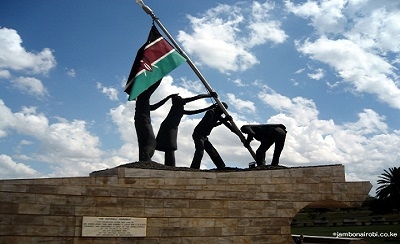
Nairobi, 10 May 2017 (ACBF) – African countries and continental institutions are working in full gear to fructify both the continent’s Agenda 2063 and the Sustainable Development Goals (SDGs), but the implementation of these blueprints demand the effective mobilization and efficient use of resources for which the role of supreme audit institutions is indispensable and must be reinforced. This is the centerpiece of a message delivered to the 14th Governing Board Meeting of the English-Speaking section of the African Organization of Supreme Audit Institutions (AFROSAI-E), that rounds off today at Nairobi’s Safari Park Hotel, by Prof Emmanuel Nnadozie – Executive Secretary of the African Capacity Building Foundation (ACBF www.acbf-pact.org).
Addressing the AFROSAI-E Board meeting as Guest Speaker, the ACBF Executive Secretary noted that the audit function, which supreme state audit institutions perform, is extremely important for the provision of the assurance, transparency and accountability services which will enhance the use of resources mobilized both domestically and internationally to implement national and continental development plans and priorities.
“However,” he said, “the African Capacity Build Foundation’s studies on governance in Africa show that the continent’s capacity for effective state auditing and public financial management is generally weak and needs to be strongly and urgently developed.”
The current inadequacy of institutions in sustainable and inclusive oversight functions on the management of State resources has a stronger crosscutting implication on all the other sectors in terms of development, he mooted. For example, he pointed out, “such lack of technical capacity at key institutions responsible for audit and oversight has led to weak regulatory structures and practices that have not acted as an effective check on the executive.”
“In the absence of effective oversight functions like those provided by supreme audit institutions (SAIs), countries would not be able to advance their economic transformation agenda.
They rather become breeding grounds for injustice, mismanagement of resources, corruption, inequality and poverty, social unrest, political instability and ultimately conflict,” which calls for an urgent improvement in the capacity of SAIs in order to increase public financial management outcomes.
The AFROSAI-E Board of Governors also gathered from the Head of ACBF that the case of inadequate capacity to give Africa its much-needed sustainable and inclusive development boost was not circumscribed to supreme state auditing functions but rather a bigger-picture issue. They were reminded of the findings of the 2017 Africa Capacity Report published by ACBF which clearly point to the disturbing fact that although 80 percent of the countries reviewed show a ‘Very High’ score on availability of necessary development policies and Acts, only 6.7 percent register the same rating in achieving development results due to low implementation capacities.
Prof Nnadozie told the Board that as spelt out in its 2017-2021 Strategy, ACBF will support African countries to enhance their Public Finance Management (PFM) capacity and would welcome partnership opportunities with AFROSAI-E in developing a joint PFM capacity development program.
-ENDS HERE-
For more information, please contact:
Abel Akara Ticha – Senior Communication Officer
The African Capacity Building Foundation
Harare, Zimbabwe
+263 7+263-4 304663, 304622, 332002, 332014; Ext. 279
Email: A.Ticha@acbf-pact.org
About the African Capacity Building Foundation
Established in 1991, ACBF builds human and institutional capacity for good governance and economic development in Africa. To date the Foundation has empowered people in governments, parliaments, civil society, private sector and higher education institutions in more than 45 countries and 6 regional economic communities. ACBF supports capacity development across Africa through mobilization and leveraging of resources for capacity development; grants, investments and fund management; knowledge services; promoting innovation in capacity development and capacity development advisory services. The establishment of ACBF was in response to the severity of Africa’s capacity needs, and the challenges of investing in indigenous human capital and institutions in Africa. ACBF interventions are premised on four principles: the centrality of capacity to the development process in Africa; the critical role of a partnership and demand-driven approach in tackling capacity challenges; African ownership and leadership in the capacity development process; and a systematic, sequenced and coordinated approach to the capacity development process that pays attention to capacity retention and utilization. For further information go to: www.acbf-pact.org





